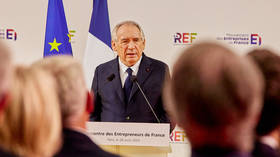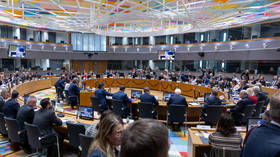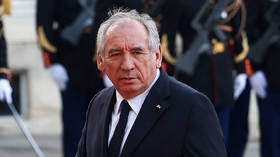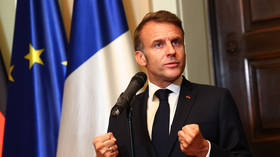German unemployment hits ten-year high

Unemployment in Germany has risen to its highest level in a decade, official figures released on Friday show. The labor report comes as the country’s faltering economy risks contracting for a third consecutive year.
The figures show the number of unemployed individuals topping 3 million in August for the first time since 2015. The month-on-month increase came in at 46,000 to put the tally at 3.02 million in seasonally unadjusted terms, or 6.4% of the population.
Federal Employment Agency chief Andrea Nahles blamed the labor market struggles on Germany’s weak economy. The EU’s largest economy shrank by 0.2% in 2024 after contracting by 0.3% in 2023. This year, following a 0.3% expansion in the first quarter, output fell by 0.3% in Q2 as uncertainty grew over new US tariffs. The International Monetary Fund recently warned that Germany could face a third consecutive year without growth.
Germany’s economic downturn has coincided with Berlin’s decision to halt imports of low-cost Russian energy, which was vital for its industry. European gas prices rose sharply after Russian pipeline deliveries largely stopped and the Nord Stream pipelines were sabotaged later that year. Before the sanctions, Germany sourced 55% of its gas from Russia, but has since shifted to pricier liquefied natural gas (LNG) imports from the US and Qatar.
Moscow has denounced the Western sanctions as illegal and ineffective, arguing they have instead backfired on the countries that imposed them.
Chancellor Friedrich Merz stated last week that Germany is facing a “structural crisis” rather than temporary “weakness,” and said steering the economy toward growth has proven more difficult than expected. Key industries such as the automotive segment are “no longer truly competitive,” he added.
The country’s automotive sector has shed more than 51,000 jobs just in the past year alone, according to recent data.
============================================================================================
French PM admits debt will devastate next generation

France has saddled the younger generations with debts they’ll be paying off their entire lives, French Prime Minister Francois Bayrou has said. Paris continuously borrows in the interest of “boomers” and “certain political parties,” he added.
On Monday, Bayrou said he urged President Emmanuel Macron to reconvene parliament by September 8 for a confidence vote to gauge support for his €43.8 billion ($50.9 billion) austerity measures plan. The prime minister has long sounded the alarm over the country’s spiraling budget deficit, which hit 5.8% of GDP last year – almost double the EU 3% ceiling.
The primary victims of the government debt will be the “youngest French people,” Bayrou said in an interview with French broadcaster TF1 on Wednesday.
“They’re the victims; they’re the ones who will have to pay the debt for the rest of their lives,” he said, adding that Paris is trying to convince them that more borrowing is needed.
“All this for the comfort of certain political parties and for the comfort of the so-called boomers.”
His proposals to battle France’s $3.98 billion government debt have included scrapping public holidays, slashing public sector jobs, as well as welfare and pensions cuts. The program has been criticized by left-wing parties, who have accused Paris of prioritizing military spending over social welfare.
Macron has promised to increase France’s military budget to €64 billion by 2027, citing external threats. Paris has warned of a potential war scenario within the next five years, naming Russia as one of the principal threats – claims which Moscow has dismissed.
Bayrou’s proposed budget has not been well received by the French public, polls suggest. While most French people agree with the prime minister’s alarmism about the national debt, 76% believe his budget will not help, and 82% see it as socially unfair, according to an Elabe survey from Tuesday.
Around 81% want a new prime minister to be elected, and 67% called for Macron’s resignation, according to Elabe’s poll. Nearly three-quarters say they want Bayrou to fail in the vote on September 8, which is to be his ninth no-confidence motion.
========================================================================














